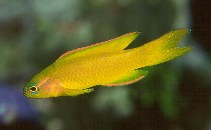| Family: |
Plesiopidae (Roundheads), subfamily: Plesiopinae |
| Max. size: |
6 cm TL (male/unsexed) |
| Environment: |
reef-associated; marine; depth range 5 - 20 m |
| Distribution: |
Western Central Pacific: Great Barrier Reef and Papua New Guinea. |
| Diagnosis: |
Dorsal spines (total): 11-11; Dorsal soft rays (total): 8-10; Anal spines: 3-3; Anal soft rays: 9-10. Description: Characterized by entirely bright yellow color except red orange stripe from eye to upper edge of operculum; submarginal red stripe at edge of dorsal and anal fins; tubed lateral line scales 17-23+3-9; finely ctenoid scales; depth of body 3.4-3.6 in SL; forked caudal fin (Ref. 90102). |
| Biology: |
Found near reefs (Ref. 7300). In aggregations in caves, often upside down. Males incubate the egg mass in their mouths (Ref. 9710). Also found in caves, crevices and under ledges (Ref 90102). Brreding in the aquarium is possible (Ref. 130644). |
| IUCN Red List Status: |
Least Concern (LC); Date assessed: 20 April 2022 Ref. (130435)
|
| Threat to humans: |
harmless |
Source and more info: www.fishbase.org. For personal, classroom, and other internal use only. Not for publication.

